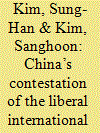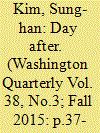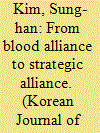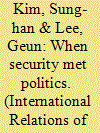| Srl | Item |
| 1 |
ID:
192167


|
|
|
|
|
| Summary/Abstract |
The concept of ‘revisionism’ has caught the attention of international relations scholars amid intensifying rivalry between the United States and China. It is a trademark of rising powers, and China was likewise expected to become a revisionist power, intent on changing the status quo. However, history tells us that not all rising powers necessarily become revolutionary states, seeking to overturn the prevailing order and replace it with another through hegemonic wars. This paper presents a novel understanding of revisionism by distinguishing between strategic ‘contestation’ and ‘challenge’. In the context of declining unipolarity, a dissatisfied rising power will contest the rules and principles of issue-specific regimes and demand legitimate adjustments that better reflect the new distribution of power. A challenge emerges when demands are rejected, and a contestation leads to ‘deconcentration’ and ‘delegitimation’ of the established order. The establishment of the AIIB can be examined as an example of contested multilateralism that falls short of a challenge. This paper concludes that China is ‘contesting’, not ‘challenging’ the liberal international order and suggests a set of countermeasures that the U.S. can think of: selective accommodation, reinforcement of alliances and partnerships, and overcoming domestic challenges such as populism that undermine the liberal values, constitutive of the liberal international order.
|
|
|
|
|
|
|
|
|
|
|
|
|
|
|
|
| 2 |
ID:
142798


|
|
|
|
|
| Summary/Abstract |
Whenever a North Korean regime “contingency” occurs, it would be the right occasion to seek unification of the Korean peninsula. But some advance peacetime strategy and vision is required to manage the security challenges and divergent priorities of all the major players involved.
|
|
|
|
|
|
|
|
|
|
|
|
|
|
|
|
| 3 |
ID:
170914


|
|
|
| 4 |
ID:
099675


|
|
|
|
|
| Publication |
2010.
|
| Summary/Abstract |
South Korea's strategic thought toward the United States has been evolving from a blood alliance during the Cold War era, to a transitional alliance during the post-Cold War era, and to a strategic alliance after September 11. Despite some trials and errors, South Korea has successfully adjusted itself to new strategic challenges by transforming and reinventing its alliance with the United States. As part of a soft-balancing strategy, this endeavor has been conducted in parallel with South Korea's improved relations with other major powers than the United States and its support for multilateral security cooperation so that the United States may not impose its own strategic preferences on South Korea. In these attempts, we can discover strategic elements that are realist (utilizing the U.S. as a strategic balancer between China and Japan), liberal (going beyond the military alliance), and constructivist (joining the regional community-building).
|
|
|
|
|
|
|
|
|
|
|
|
|
|
|
|
| 5 |
ID:
101960


|
|
|
|
|
| Publication |
2011.
|
| Summary/Abstract |
This study delves into an empirical case analysis of the desecuritization process of the North Korean threat under the Kim Dae-jung government. Unlike previous studies, it analyzes how domestic and international actors desecuritized traditional threats by taking the pluralistic political processes of a democratic polity seriously. This was the process of competition between different political coalitions and the process of transformation from issues of high politics into issues of low politics. It remains to be seen whether the Kim Dae-jung government's desecuritization of North Korean threats was a deep or a shallow one, but it appears to be clear that the desecuritization of North Korean threats by the Kim Dae-jung government paved the way for another 5 years of progressive government with Roh Moo-hyun's 'unexpected' victory in the 2002 presidential election.
|
|
|
|
|
|
|
|
|
|
|
|
|
|
|
|